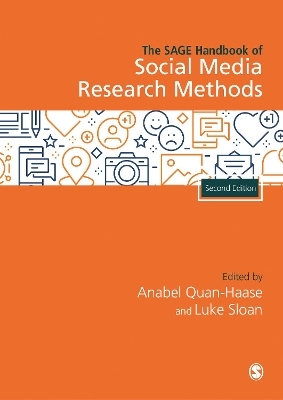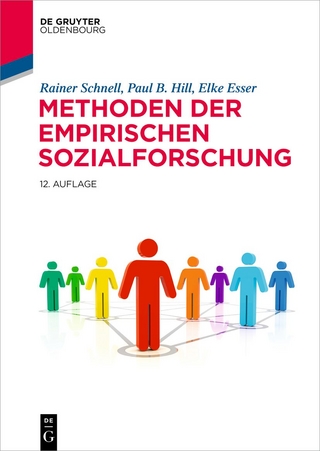
The SAGE Handbook of Social Media Research Methods
SAGE Publications Ltd (Verlag)
978-1-5297-2096-9 (ISBN)
The SAGE Handbook of Social Media Research Methods spans the entire research process, from data collection to analysis and interpretation. This second edition has been comprehensively updated and expanded, from 39 to 49 chapters. In addition to a new section of chapters focussing on ethics, privacy and the politics of social media data, the new edition provides broader coverage of topics such as:
Data sources
Scraping and spidering data
Locative data, video data and linked data
Platform-specific analysis
Analytical tools
Critical social media analysis
Written by leading scholars from across the globe, the chapters provide a mix of theoretical and applied assessments of topics, and include a range of new case studies and data sets that exemplify the methodological approaches.
This Handbook is an essential resource for any researcher or postgraduate student embarking on a social media research project.
PART 1: Conceptualising and Designing Social Media Research
PART 2: Collecting Data
PART 3: Qualitative Approaches to Social Media Data
PART 4: Quantitative Approaches to Social Media Data
PART 5: Diverse Approaches to Social Media Data
PART 6: Research & Analytical Tools
PART 7: Social Media Platforms
PART 8: Privacy, Ethics and Inequalities
Dr. Anabel Quan-Haase (Ph.D., University of Toronto) is a Full Professor of Sociology and Information and Media Studies at Western University and the Rogers Chair in Studies in Journalism and Information Technology. She is the author of Technology and Society (Oxford University Press, 2020), co-author of Real-Life Sociology (Oxford University Press, 2021), co-editor of the Handbook of Social Media Research Methods (Sage, 2022), and co-editor of the Handbook of Computational Social Science (Routledge, 2022). Dr. Quan-Haase has published over 100 peer-reviewed articles, book chapters, and conference proceedings. She is past chair of the Communication, Information Technology, and Media Sociology section of the American Sociological Association and past president of the Canadian Association for Information Science. Through her policy work she has cooperated with the Benton Foundation, Partnership for Progress on the Digital Divide, Federal Communications Commission (FCC), and Canada’s Digital Policy Forum. Luke Sloan is Professor and Deputy Director of the Social Data Science Lab and reader at the School of Social Sciences, Cardiff University. His research focuses on understanding what social media can tell us about the social world, with a particular emphasis on data linkage and ethics.
Chapter 1: Introduction - Anabel Quan-Haase & Luke Sloan
Part 1: Conceptualising and Designing Social Media Research
Chapter 2: Defining Social Media and Asking Social Media Research Questions: How Well Does the Swiss Army Knife Metaphor Apply? - Charlotte Nau, Anabel Quan-Haase, & Lori McCay-Peet
Chapter 3: Before Methods: Social Media Research Considerations - Bree McEwan & Jesse Fox
Chapter 4: Building Social Media Interdisciplinary Research Teams across Academia, Industry, and Community: Motivations, Challenges, and Policy Frameworks - Anabel Quan-Haase, Riley McLaughlin, & Lori McCay-Peet
Chapter 5: Key Consideration in the Interpretation of Digital Trace Data - Andrew D. Nevin, Yimin Chen, Shuzhe Yang, & Anabel Quan-Haase
Chapter 6: Who Uses Social Media? - Grant Blank
Chapter 7: Representativeness and Bias in Social Media Research: Quantitative and Qualitative Approaches to Sampling - William Hollingshead, Anabel Quan-Haase, & Grant Blank
Part 2: Collecting Data
Chapter 8: Sourcing Data from Social Media via APIs - Dietmar Janetzko
Chapter 9: Using Social Media in Data Collection: Designing Studies with the Qualitative E-Research Framework - Janet Salmons
Chapter 10: Understanding Individual Web Browsing: Social Media Use in Context - Ericka Menchen-Trevino & Chris J. Karr
Chapter 11: Gathering Behavioural Data from User-Provided Social Media Downloads - Jazmin A. Reyes-Portillo, Chris J. Karr, & Marya E. Corden
Part 3: Qualitative Approaches to Social Media Data
Chapter 12: Small Data, Thick Data: Data Thickening Strategies for Social Media Research - Guillaume Latzko-Toth, Claudine Bonneau, & Melanie Millette
Chapter 13: Scaling Up Qualitative Research Methods with Natural Language Processing Tools: The Case-Study of the Columbia′s 2018 Presidential Election in Twitter - Erin Huner & Juan Luis Suárez
Chapter 14: The Visual in Social Media: Understanding Visual Objects, Mobilities, and Practices - Martin Hand
Chapter 15: Twitter as Method: Using Twitter as a Tool to Conduct Ethnographic Research - Bonnie Stewart
Chapter 16: Netnography - An Approach to Ethnography in the Digital Age - Alex Fenton & Keith Parry
Chapter 17: Corpus-Assisted Critical Discourse Analysis of Social Media Data: Tools and Techniques - Jaigris Hodson & Laura M. Lefevre
Chapter 18: Small Stories Research: A Narrative Paradigm for the Analysis of Social Media - Alexandra Georgakopoulou
Part 4: Quantitative Approaches to Social Media Data
Chapter 19: Geospatial Analysis - Olga Buchel & Diane Rasmussen Pennington
Chapter 20: Predictive Analytics with Social Media Data - Niels Buus Lassen, Lisbeth la Cour, & Ravi Vatrapu
Chapter 21: Machine Learning and Neural Network Language Models for Sentiment Analysis - John McLevey & Tyler Crick
Chapter 22: The Multi-Scalar Complexities of Analysing the City through Social Media Data - Pablo Marti & Leticia Serrano-Estrada
Chapter 23: Multiscale Functional Communities - Olga Buchel & Leila Hedayatifar
Part 5: Diverse Approaches to Social Media Data
Chapter 24: Innovative Social Location-Aware Services for Mobile Phones - Bernhard Klein & Ulf-Dietrich Reips
Chapter 25: The Good, the Bad and the How-To of Analyzing Social Media Data - Frauke Zeller
Chapter 26: Situating Location Data in Social Media Research - Darryl Pieber
Chapter 27: Content Verification for Social Media: From Deception Detection to Automated Fact-Checking - Victoria L. Rubin
Part 6: Research & Analytical Tools
Chapter 28: COSMOS 2.0: The Journey of Developing a Social Analytic Tool - Mohamed Mostafa & Arron Cullen
Chapter 29: Social Lab: An ′Open Source Facebook′ - Ulf-Dietrich Reips & Pablo Garaizar
Chapter 30: A Python Tutorial for Social Scientists: Using the YouTube API and Advanced Supervised Text Classification Methods to Detect COVID-19 Toxic (Misinformation) Comments on YouTube - Morteza Shahrezaye, Fabienne Marco, Joana Bayraktar, & Simon Hegelich
Chapter 31: R for Social Media Analysis - Saurabh Dhawan & Simon Hegelich
Chapter 32: Using Netlytic to Analyze Twitter Conversation about the 2014 Euromaidan Revolution in Ukraine - Anatoliy Gruzd, Philip Mai, & Andrea Kampen
Chapter 33: Computational Temporal Thematic Analysis of Social Media Data - Danial Angus
Chapter 34: NodeXL – Twitter Social Media Network Insights in Just a Few Clicks - Wasim Ahmed, Harald Meier, & Marc Smith
Chapter 35: Studying Anti-Social Behaviour on Reddit with Communalytic - Anatoliy Gruzd, Philip Mai, & Zahra Vahedi
Chapter 36: Sentiment Analysis - Mike Thelwall
Part 7: Social Media Platforms
Chapter 37: Coding Twitter Data Using Qualitative and Computational Methods: A Mixed Methods Framework - Dhiraj Murthy
Chapter 38: The Reddit Data Analysis Pipeline for Researchers - Yadira Lizama-Mué & Juan Luis Suárez
Chapter 39: Turning to Alternative Social Media - Gordon Gow
Chapter 40: Instagram Revisited - Linnea Laestadius & Alice Witt
Chapter 41: WeChat - Jimman Zhang & Anabel Quan-Haase
Chapter 42: Collecting and Analyzing Weibo Data: A Roadmap for Social Research - Zhifan Luo & Muyang Li
Chapter 43: Social Media for Joint Experimental, Survey, and Observational Data Collection: The case of VKontakte (VK) - Olessia Koltsova
Chapter 44: Researching YouTube: Methods, Tools, and Analytics - M. Laeeq Khan & Aqdas Malik
Chapter 45: Researching TikTok: Themes, Methods, and Future Directions - Alex Miltsov
Part 8: Privacy, Ethics and Inequalities
Chapter 46: Inequalities in Social Media Use and their Implications for Digital Methods Research - Christoph Lutz
Chapter 47: Linking Twitter and Survey Data: Gaining Consent, Making the Link, and Maintaining Data Security - Luke Sloan, Tarek Al Baghal, & Curtis Jessop
Chapter 48: Ethics of Using Social Media Data in Research: Users’ Views - Jenna Jacobson & Irina Gorea
Chapter 49: Privacy, Consent, and Confidentiality in Social Media Research - Jacquie Burkell, Priscilla M. Regan, & Valerie Steeves
| Erscheinungsdatum | 10.10.2022 |
|---|---|
| Verlagsort | London |
| Sprache | englisch |
| Maße | 174 x 246 mm |
| Gewicht | 1500 g |
| Themenwelt | Sozialwissenschaften ► Soziologie ► Empirische Sozialforschung |
| ISBN-10 | 1-5297-2096-6 / 1529720966 |
| ISBN-13 | 978-1-5297-2096-9 / 9781529720969 |
| Zustand | Neuware |
| Haben Sie eine Frage zum Produkt? |
aus dem Bereich


